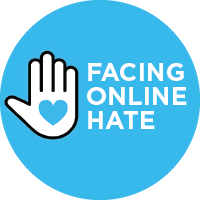
Online Propaganda and the Proliferation of Hate
In this lesson students learn about the ways that propaganda techniques are used to promote hatred and intolerance online.

In this lesson students learn about the ways that propaganda techniques are used to promote hatred and intolerance online.

Along with images of natural disasters and violence, one all-too-common news item that can be distressing to kids is reports of hate crimes. Seeing or hearing about hate-motivated assaults and vandalism of homes, cemeteries and places of worship in media, can lead to fear and anxiety in young people, especially if they belong to a vulnerable group. In many cases, the effect will be worse because news isn't the only place Canadian kids see hate and racism: almost half see hateful content online at least once a month, and one in six sees it every day.

What do we mean by propaganda?
Not all propaganda is bad! It can inspire positive emotions like love, pride and empathy. It can persuade us to do things like putting on seatbelts or brushing our teeth.
Hate propaganda is different: it tries to make us fear and distrust another group of people.


The Boston Marathon tragedy has raised questions about the role the Internet plays in radicalizing youth and, more generally, how it may be used to perpetuate hatred. In Canada, similar questions are being asked about the radicalization of four London Ontario students in the wake of last January’s attack on an Algerian gas plant.

As your kids grow older, their gift requests may start to look a lot different than when they were younger. While they once circled all the toys in the holiday catalogues that arrived at the door, now they are sending parents text messages or Google Docs with links to their wish list items.

Most kids see hate and prejudice online, and most of them say it's important to do something about it. But whether you've seen a video that's full of racist conspiracy theories or have just seen a friend share an offensive meme, it can be hard to know what to do about it.

Framed around key concepts of media literacy, the Facing Online Hate tutorial examines how the Internet is used to spread and incite hate, how radicalization occurs, and how youth encounter hate online both through traditional hate sites and “cultures of hatred”.

Most kids see hate and prejudice in places like games, social networks, and online videos. They also say that they want to do something about it when they see it, but don't know what to do.
